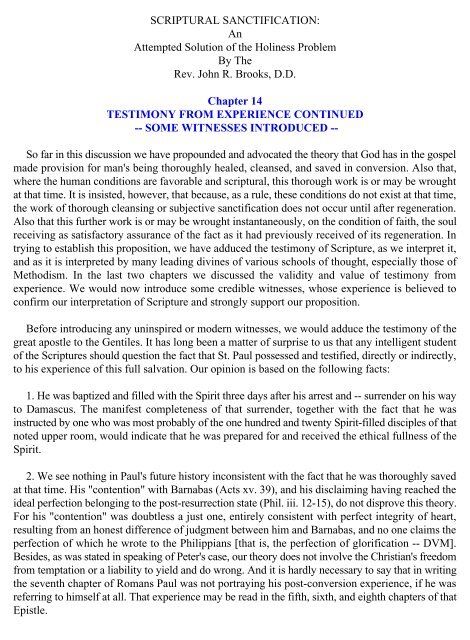Scriptural Sanctification - Media Sabda Org
Scriptural Sanctification - Media Sabda Org
Scriptural Sanctification - Media Sabda Org
You also want an ePaper? Increase the reach of your titles
YUMPU automatically turns print PDFs into web optimized ePapers that Google loves.
SCRIPTURAL SANCTIFICATION:<br />
An<br />
Attempted Solution of the Holiness Problem<br />
By The<br />
Rev. John R. Brooks, D.D.<br />
Chapter 14<br />
TESTIMONY FROM EXPERIENCE CONTINUED<br />
-- SOME WITNESSES INTRODUCED --<br />
So far in this discussion we have propounded and advocated the theory that God has in the gospel<br />
made provision for man's being thoroughly healed, cleansed, and saved in conversion. Also that,<br />
where the human conditions are favorable and scriptural, this thorough work is or may be wrought<br />
at that time. It is insisted, however, that because, as a rule, these conditions do not exist at that time,<br />
the work of thorough cleansing or subjective sanctification does not occur until after regeneration.<br />
Also that this further work is or may be wrought instantaneously, on the condition of faith, the soul<br />
receiving as satisfactory assurance of the fact as it had previously received of its regeneration. In<br />
trying to establish this proposition, we have adduced the testimony of Scripture, as we interpret it,<br />
and as it is interpreted by many leading divines of various schools of thought, especially those of<br />
Methodism. In the last two chapters we discussed the validity and value of testimony from<br />
experience. We would now introduce some credible witnesses, whose experience is believed to<br />
confirm our interpretation of Scripture and strongly support our proposition.<br />
Before introducing any uninspired or modern witnesses, we would adduce the testimony of the<br />
great apostle to the Gentiles. It has long been a matter of surprise to us that any intelligent student<br />
of the Scriptures should question the fact that St. Paul possessed and testified, directly or indirectly,<br />
to his experience of this full salvation. Our opinion is based on the following facts:<br />
1. He was baptized and filled with the Spirit three days after his arrest and -- surrender on his way<br />
to Damascus. The manifest completeness of that surrender, together with the fact that he was<br />
instructed by one who was most probably of the one hundred and twenty Spirit-filled disciples of that<br />
noted upper room, would indicate that he was prepared for and received the ethical fullness of the<br />
Spirit.<br />
2. We see nothing in Paul's future history inconsistent with the fact that he was thoroughly saved<br />
at that time. His "contention" with Barnabas (Acts xv. 39), and his disclaiming having reached the<br />
ideal perfection belonging to the post-resurrection state (Phil. iii. 12-15), do not disprove this theory.<br />
For his "contention" was doubtless a just one, entirely consistent with perfect integrity of heart,<br />
resulting from an honest difference of judgment between him and Barnabas, and no one claims the<br />
perfection of which he wrote to the Philippians [that is, the perfection of glorification -- DVM].<br />
Besides, as was stated in speaking of Peter's case, our theory does not involve the Christian's freedom<br />
from temptation or a liability to yield and do wrong. And it is hardly necessary to say that in writing<br />
the seventh chapter of Romans Paul was not portraying his post-conversion experience, if he was<br />
referring to himself at all. That experience may be read in the fifth, sixth, and eighth chapters of that<br />
Epistle.
















